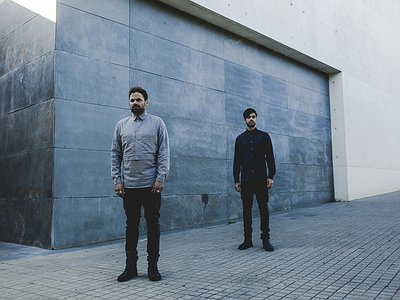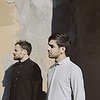Name: Carmine Conte, Matteo Milleri
Occupation: Producers/DJs
Current Release: Endless on Deutsche Grammophon
Website: If you enjoyed this interview with Tale Of Us, check out their Facebook profile for further information.
This interview was conducted with Carmine Conte speaking for Tale of Us and is part of new series of in person conversations based more loosely on the 15 Questions concept, allowing for more personal and open questions.
What drew you to sound?
I studied the piano and took lessons for seven or eight years, from when I was about 7 years old until I was 16. When I continued with music, I discovered electronic music production in general, and Reason in particular. Reason was stunning. Everything was suddenly possible! At that moment, my brain went: Okay, that's it, I'm done, finished. You don't have to look for anything else. All your answers are inside that program. I had a great piano, but I didn't practise and I didn't play it for the right reasons. Like most of the things I did in my life before, actually – such as studying law, going to scientific secondary school. I was a guy who would dream about things instead of really knowing how something works. I might have an idea of how something could be. But I didn't know how it works.
So there's something about music that you couldn't express through drawing for example?
Yes, obviously. I think with music, you can modulate the air vibration to create something that stays there and provides emotion. Something internal, like a movie in your organs. And you can create this with an idea. That is what music is, to me: An idea. It is not tangible. It can disappear, but at the same time, it's there. What we're doing with Tale Of Us is to create a moment, a vibe. That is our main skill. Endless, our album on Deutsche Grammophon, is a collection of moments of life, represented by a layer of sounds engaged in constant build-ups.
You once said that you wanted to play the piano after seeing someone perform a piece in concert. Do you remember who that was?
No, but I do remember I was very young, around six. That was the beginning. The day after, I stressed out my father that I wanted a piano. The experience took place on a trip from school, so I was at that concert with all my class mates. Usually, I was like a devil, always a problem for the teachers. But on that day, I was hypnotised, mesmerised. Even the teacher who was sitting next to me to keep me in check, was like: "Wow, what's happened to you? I never saw you like this in my life. I have to call a doctor or something."
And that's something both me and Matteo have with music: We have this absolute clarity about what we like. You know that there are people who can be easily hypnotised? We're like that when it comes to music. I can be totally astonished by one track and I can also be really disgusted by another. It matters a lot. Even with our own music, we can sometimes not express what we're thinking for 100%. The way we care for details, the way we select the tracks we want to release on our label or the tracks we want to play, or that we want to even discuss about. This is something that I'm very proud of, actually.
Were you listening to classical music a lot as a kid?
Yes and no. I used to listen to Chopin and he's still one of my favourites. And when I was a kid, I found classical music a bit too complicated. I found myself playing Bach and not really feeling it sometimes. It's not a judgment of quality. I simply didn't feel I was a classical performer, I didn't want to be a pianist and pursue that path. I loved that momen on our school trip, I loved what that guy in that moment did to me. But I didn't love the instrument even though it is beautiful.
Everyone who has a sense of aesthetic like a piano in the middle of the room with the right lights on it, it's amazing. But what really matters is what you can create with that instrument. The experience is like a drug. You feel it and then you want to try it again and taste it again. The first moment you hear a pianist, the first moment you step into a club, the first rave … I'm garding these moments very jealously. And I try to recreate them and recall them in my mind and try to represent them with my tools and my experience.
It must have been a big step going from the piano to Reason. What were the challenges in the beginning?
The challenge was to learn how to use the interface. The music was just coming out. We started 2005/2006 in Milan. We met at sound engineer school, the SEI, where we were attending sound engineer class. We didn't finish it, because it was not very interesting. It was too much about the tools, it was more for a studio technician. Of course, this stuff is very important, but it was not really for us. So we decided to move from Milan to Berlin and create music.
When we started together, we had this idea of teaming up for something very special. It was not dance music like any other, but two minds that really felt like there was something special happening between us. We were just happy to be there and give birth to what seemed to us incredible music at the time. If I could only find my first computer, it would be so great to listen to that music again. We lost three computers and five to six years of music.
Do you roughly remember what those tracks were like?
There was a lot of contamination from deep house and minimal. I was doing something more minimal, in the style of Baraca Records, a label from Valencia – similar to Ricardo [Villalobos], microhouse, the early Romanian producers or someone like Thomas Melchior. When I came to Berlin, I also received a lot of good influences from the scene around Bar25 and Panorama Bar. Berlin helped us a lot to evolve our music. It also contributed a lot to our comprehension of the music and our respect for it.
Did you ever look to other artists for inspiration?
No, never. Honestly, I like to listen to something that's good, but I don't like to follow something. I didn't listen to much music in the beginning. Instead, I would play what I really liked over and over again. I didn't explore a lot, because I didn't want these influences to dilute what I knew was happening in my own music.
Then, when I had fixed my style, I started to dig into different kinds of music., Over the last five to seven years, I discovered a lot of bands and styles, including rock. I know it's a crime, but we discovered Boards of Canada only in 2012 … We were like, wow, what is this?
This came through Manfredi playing you his records?
Yes, he was a great mentor. He can draw from a lot of experience, he always has the right advice. It is really important for us to have someone like that… We create music without rules. From breakbeat to ambient and techno, whatever. Our only purpose is to enjoy the process., And to have someone like Manfredi sitting next to you, as it were, who can connect the tracks you're making to what else is out there, is vital. He would, for example, say: This is more like WhoMadeWho. That other one has more of a Prins Thomas vibe. And that one is more like Boards of Canada. This one reminds me of Murcof.
We didn't hear all of these links. For us, it came organically. But someone else may be able to find similarities. And they might say: You can go there and dig into that artist. That's how we worked and how we learnt to make music.
Tell me a bit about your influences and inspirations.
Soundtrack music is the main background to my life. Alain Silvestri, Angelo Badalamenti, Eric Serra's soundtrack to "Nikita". Serra is incredible …
… "Le grand bleu" …
"Le grand bleu" is not my favourite, but it's beautiful. Ennio Morricone is an obvious choice, but he's great, too. Nils Frahm helped us a lot to move on to a stage where we could actually make use of these influences after pondering for quite some time about what to do with them. People were stunned when they first heard our music with Tale Of Us, but to me, it's very similar to something by Jean-Michel Jarre or Vangelis, only more minimal and personal. It has become more subtle now in terms of influences and there has been an increase both in interest and comprehension among the crowd. You can see something similar happening with artists like Nils Frahm or Kiasmos …
[Read our Nils Frahm interview]
[Read our Olafur Arnalds interview]
[Read our Janus Rasmussen of Kiasmos interview]
… or with your friends of Mind Against, of course.
Them as well, yes. I'm talking about classical experimental music, now, and I'm not putting everything on the same level. I think we're a sort of bridge between the two camps. In a humble way, we can be a connection between cinematic techno and ambient, experimental music, and try to merge them.
Mind Against also sound like Tangerine Dream on quite a few tracks. But I don't think that's what they're consciously trying to do.
Exactly, it's not what they set out to do. It's what comes out. It is only through experience that you can trace the roots of the music. And if you are pure and if you keep the music that way, you can invent something that will be new for a younger generation. After all, sadly, not everyone knows Tangerine Dream. As a last track at our DJ sets, we often like to play "Love on a Real Train", which they composed for the "Risky Business" soundtrack. It's incredible.



